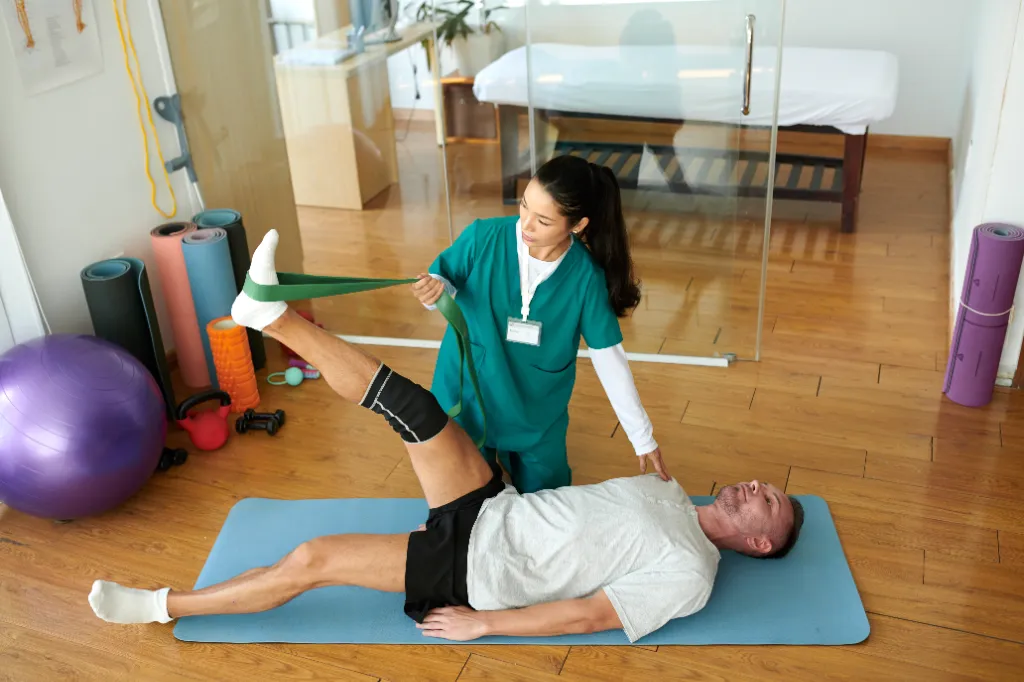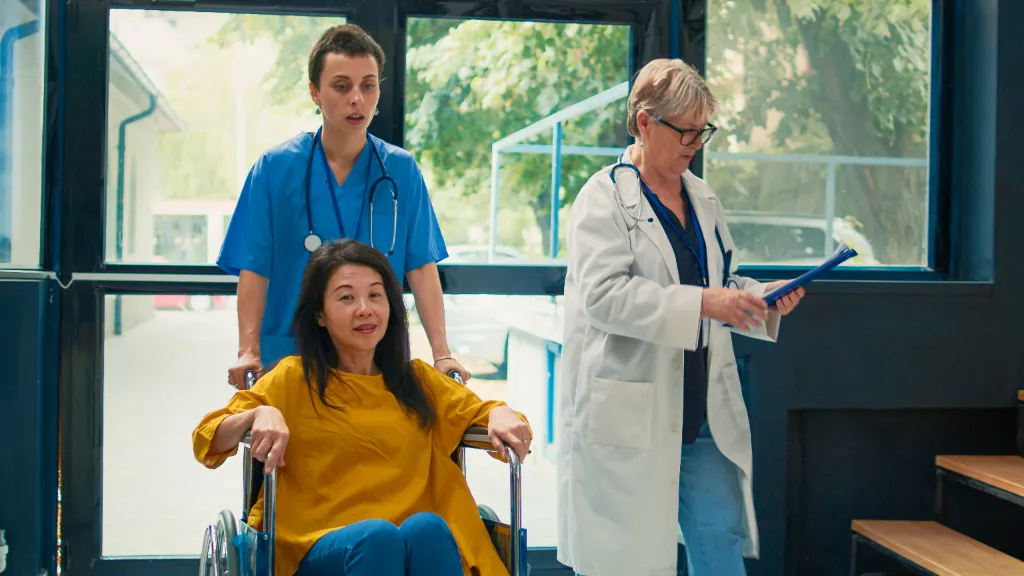Reablement as a Holistic Approach to Recovery
Reablement support is a holistic approach to recovery and is a form of short-term care supporting individuals after discharge. The main goal of this approach is to help people regain skills and confidence to live and stay independent as much as possible by receiving tailored, structured and compassionate support after a hospital stay.
Reablement, also known as intermediate care, consists of daily monitoring and support from highly trained clinicians that boost confidence and encouragement so people can go about their daily lives independently. These intermediate care services improve skills and help people learn new skills essential to performing daily activities. Intermediate care is offered for two to six weeks. The teams working in reablement care provide ongoing and tailored support in people’s homes, focusing on consistency to establish strong relationships built on trust.
The foundation of reablement lies in its strengths-based and person-centred approach that promotes well-being and improves independence. The role is to ensure a positive outcome for people who need time to regain their skills and confidence after hospital discharge.
The Need of Reablement Care after Hospital Discharge
After-hospital care is a bridge between rehabilitation in hospital settings and people’s homes. Care at home can deliver all-encompassing support specifically tailored to the needs of the individual. Highly trained clinicians deliver multi-faceted support to optimise people’s recovery and ensure well-being.
After being discharged from the hospital, some people may require personal care assistance, household support and other well-being adjustments. This way, people can feel comfortable and safe in their own homes and focus on their journey to recovery. After-hospital care aims to provide reablement until the person regains independence and feels ready and self-reliant.
Key Components of Reablement Care
As a person-centred approach to restoring and improving people’s independence, reablement care focuses on people’s functional abilities after an illness or injury. At its core, reablement focuses on supporting people to regain their confidence. The goal is to do things with them rather than for them. With that said, there are a few key components that are an integral part of reablement care.
Physical Rehabilitation
Physical rehabilitation is a cornerstone of reablement care, playing a crucial role in restoring and enhancing an individual’s abilities following illness or injury. This component of reablement focuses on improving physical strength, mobility, coordination, and flexibility to promote independence in everyday tasks.

Physical rehabilitation often incorporates functional training, which involves practising everyday tasks and activities that the individual needs or wants to be able to perform independently. These various everyday tasks could include dressing, grooming, bathing, cooking, and household chores. By integrating functional activities into rehabilitation, individuals can transfer their improved physical abilities to real-life situations, enhancing their overall independence and confidence.
Emotional and Psychological Support
One of the primary roles of emotional and psychological support in intermediate care is to address the impact of health concerns or life changes. Emotional and psychological support professionals, such as counsellors, therapists, social workers or other social services professionals, provide individuals with a safe and supportive environment. This helps them express their emotions, process their experiences, and develop coping strategies to manage stress and uncertainty.
Emotional and psychological support in reablement is tailored to each individual’s unique needs and preferences. Professionals work collaboratively to develop personalised strategies and interventions that align with their goals, values, and cultural backgrounds. This person-centred approach ensures that support is meaningful, relevant, and effective in promoting emotional well-being and recovery.
Social Inclusion and Community Engagement
This aspect of intermediate care recognises that social relationships and community involvement play a significant role in shaping one’s sense of identity, purpose, and quality of life. One of the key objectives of social inclusion in reablement is to facilitate the individual’s reintegration into their community and support networks. Health concerns, injury, or loss of independence can often lead to social isolation and feelings of loneliness, which can have a negative effect on physical and mental health.
Social inclusion in intermediate care services involves addressing barriers to participation and promoting accessibility in the community. This may include advocating for accessible transportation, modifying the physical environment to accommodate mobility aids, or providing education and awareness training to community members about disability and inclusion.
The Role of Unique Community Services
Our clinicians at Unique Community Services play an essential role in intermediate care and increasing people’s self-reliance. This is crucial in improving mental and physical well-being and overall quality of life. We focus on creating a holistic, tailored approach that respects human rights and the dignity of the people we support.
The reablement services we offer enable people to regain their abilities, skills and confidence but also to ensure the best possible outcome.
Transition Support
Transition support in reablement care refers to the assistance and services provided to individuals as they transition from a hospital setting back to their own home or community following a health concern, injury, or medical procedure. This phase of reablement is critical for ensuring a smooth and successful transition, minimising the risk of hospital readmission, and supporting the individual’s recovery and independence.
Personalised Care Plans
An individual’s recovery journey is unique and influenced by their needs, personal preferences, and support network. Personalised care plans allow healthcare professionals, like social worker doctors carers, to tailor support and interventions to meet each person’s needs. By addressing individual needs, personalised care plans increase the likelihood of successful recovery outcomes.
Physical Rehabilitation Services
Physical rehabilitation services are essential, helping individuals restore and maximise their physical function, independence, and quality of life following health concerns or an injury. Through personalised assessment, goal-oriented interventions, functional training, assistive devices, education, and ongoing support, physical rehabilitation services empower individuals to achieve their rehabilitation goals, regain their autonomy and stay independent.
Mental Health Care
Mental health care is vital in motivating and engaging individuals in their reablement journey. Positive mental health promotes a sense of optimism, self-efficacy, and determination, which are essential for setting and achieving rehabilitation goals. Intermediate care often involves facing challenges and overcoming obstacles on the path to recovery. Mental health care equips individuals with coping skills and stress management strategies to deal effectively with setbacks, frustrations, and uncertainties. By learning to manage stress and maintain a positive outlook, individuals are better able to persevere through difficulties and sustain momentum in their rehabilitation journey.
Building Confidence and Resilience
Confidence and resilience empower individuals to participate actively in their recovery journey. Individuals feel a sense of agency and control over their health and well-being by believing in their ability to overcome challenges and progress. This empowerment fosters a positive mindset and enhances motivation to engage in reablement activities, leading to more successful outcomes. Confidence and resilience help individuals manage feelings of anxiety and stress associated with the recovery process. By believing in their abilities to overcome challenges and adapt to change, individuals experience less fear and uncertainty about the future. This reduces anxiety and promotes a sense of calm and stability, which is conducive to recovery and well-being.
Promoting Independence
Promoting independence during reablement is a fundamental goal aimed at empowering individuals to regain or maintain their ability to carry out activities of daily living and participate fully in their communities. Reablement support also includes education and training to build individuals’ self-care, safety, and problem-solving skills and knowledge. Promoting independence during reablement involves a holistic approach that addresses the individual’s physical, cognitive, emotional, and environmental needs.
Person-Centred Care Within Reablement Care
Person-centred care is an approach in health and social care where health professionals work with the care recipient to reach positive outcomes. It also puts people at the centre of their care.

This approach aims to empower people to make well-informed decisions about their health and fulfil their needs by regaining independence. The cornerstone of this approach is to always treat people with respect, dignity and empathy. Person-centred care is a proven approach to establishing positive health outcomes for individuals under care but also for their families and loved ones.
Get Support With Unique Community Services
If you want to transform your journey to independence through our person-centred approach and with support from compassionate teams of professionals, reach out to Unique Community Services.
You can contact us today through one of our offices in Manchester, Leeds, or Bristol.
Take the first step forward into reclaiming your independence today. From complex care and personal care support, we can deliver humanised, tailored complex care to people with short-term and long-term needs while focusing on supporting people to become active participants in the community.














